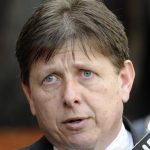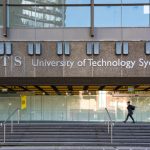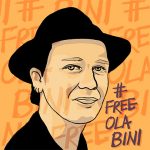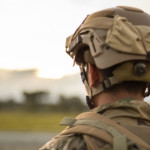Scott Morrison: An Extreme Conservative with Divisive Policies
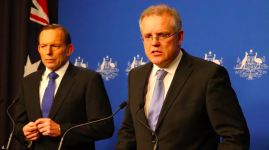
Many Australians breathed a collective sigh of relief last week when Peter Dutton was defeated in the Liberal leadership battle. The prospect of having the minister behind some of the most divisive policy decisions in recent years at the nation’s helm was daunting to say the least.
It was Scott Morrison who defeated Dutton in the challenge to become the new prime minister of this country. Leading up to the deciding vote, the former treasurer was being touted as the moderate alternative to the still reining home affairs minister.
However, Morrison, a key figure in the Coalition’s religious right, is anything but moderate. Since he was voted into federal parliament in the NSW seat of Cook in 2007, the former immigration and border protection minister has shown himself to be an extremely conservative force.
And questions are now being raised as to how the 30th Australian prime minister is going to carry out his recent promise to make Australia “even greater.” But, considering the politics Morrison has played in the past, it looks like we’ll see more of the same from the Coalition government.
Anti-Muslim sentiments
In 2011, Morrison urged the shadow cabinet to capitalise on the growing concerns over Muslim immigration and the Muslim community, which is a strategy one would more likely expect to hear One Nation politicians proposing.
Morrison, then opposition immigration spokesperson, further suggested that the Coalition should be focusing on a perceived perception in the community that Muslims have an inability to integrate and that the party should also questioning multiculturalism.
Tough on refugees
As immigration and border protection minister, Morrison launched Operation Sovereign Borders in September 2013. This highly derided Coalition policy has seen the turning back of asylum seeker boats and the mandatory offshore detention of those arriving by sea.
Today, under this regime, 112 children are still imprisoned on Nauru. And some of these kids, as young as 10 and 11, have been attempting to take their own lives.
The ABC aired a leaked video that Morrison made in 2013, which was directed to the detainees on Manus Island and Nauru. The current PM explains to those watching that they’ve been placed in offshore detention as they had attempted to enter Australia illegally by boat.
“If you have a valid claim, you will not be resettled in Australia,” Morrison tells the legitimate refugees who are locked inside the centres. “If you choose not to go home, then you will spend a very, very long time here.”
And last week’s moderate candidate for the top job also saw the passing of legislation in 2014, which removed any duty for the government to comply with international law or act fairly when detaining refugees at sea.
A man of faith
Scott Morrison is the first prime minister of Australia who has been a member of the Pentecostal church. He’s a long-time parishioner at the Sutherland Shire’s Horizon Church, which is an institution that operates in a similar manner to the well-known Hillsong Church.
In his 2008 maiden speech in parliament, Morrison said his “personal faith in Jesus Christ is not a political agenda.” He then stated that it’s fashionable these days to profess that those of the Christian faith are “extreme” and that their religion has no place in political debate.
“Australia is not a secular country—it is a free country,” the new prime minister explained. “This is a nation where you have the freedom to follow any belief system you choose. Secularism is just one. It has no greater claim than any other on our society.”
Religious freedoms
In an interview with Fairfax Media late last year, Mr Morrison said he’d be fighting against discrimination against Christians. And he vowed to play a leading role in the push to enact laws protecting religious freedoms, following the findings of the inquiry chaired by Philip Ruddock.
The Ruddock inquiry into religious freedoms was set up by Turnbull in response to the concerns of some of his colleagues over same-sex marriage laws. Morrison opposed marriage equality and led the push to have religious protections amendments included in the same-sex marriage bill.
The religious freedoms protections the religious right would like to see enacted would allow religious individuals to treat others whose belief systems they don’t agree with – such as members of the LGBTIQ community – in such way that would be seen as discriminatory under existing laws.
Indigenous affairs
One of the first decisions Morrison made as prime minister was to offer the role of Indigenous affairs special envoy to Tony Abbott, which led National Congress of Australia’s First Peoples co-chair Jackie Huggins to remark, “Haven’t we been punished enough?”
The former PM has accepted the offer, even thought he has a terrible track record in dealing with First Nations communities. His government cut $500 million from the Indigenous affairs budget. And he referred to those living in remote Aboriginal communities in WA as making “a lifestyle choice.”
Morrison’s take on Aboriginal and Torres Strait Islander affairs is no better. He has publicly back the NT Intervention. He voted in favour of last year’s native title amendments. And as treasurer, he set aside $3 million for a controversial proposed statue of Captain Cook.
Renaissance man, or not?
Whilst in opposition, Mr Morrison took a 2013 trip to Sri Lanka, accompanied by Julie Bishop and Michael Keenan. The Liberal party members met with the Sri Lankan government to discuss asylum seeker matters. On his return, Morrison announced his party’s policy of stopping the boats.
As immigration minister in 2014, Morrison handed over 41 Sri Lankan asylum seekers, including 4 Tamils, to Sri Lankan authorities in a transfer at sea. His department also detained 157 Sri Lankan asylum seekers on a boat for a month before sending them to Nauru.
Then in October 2015, Morrison appeared in the first episode of the fifth season of Kitchen Cabinet: a program that involves journalist Annabel Crabb interviewing leading politicians in their homes as the two of them prepare a meal together.
Mr Morrison decided to treat Ms Crabb to some Sri Lankan somas and curry. Our current prime minister said he’d developed a taste for Sri Lankan food during his visit to the country. This was the trip during which he arranged to send those fleeing persecution back to Sri Lanka.
Ms Crabb was surprised to see the then treasurer making his own chapatis. “What? You’re making your own chapatis,” she remarked. “What a renaissance man you are.”



